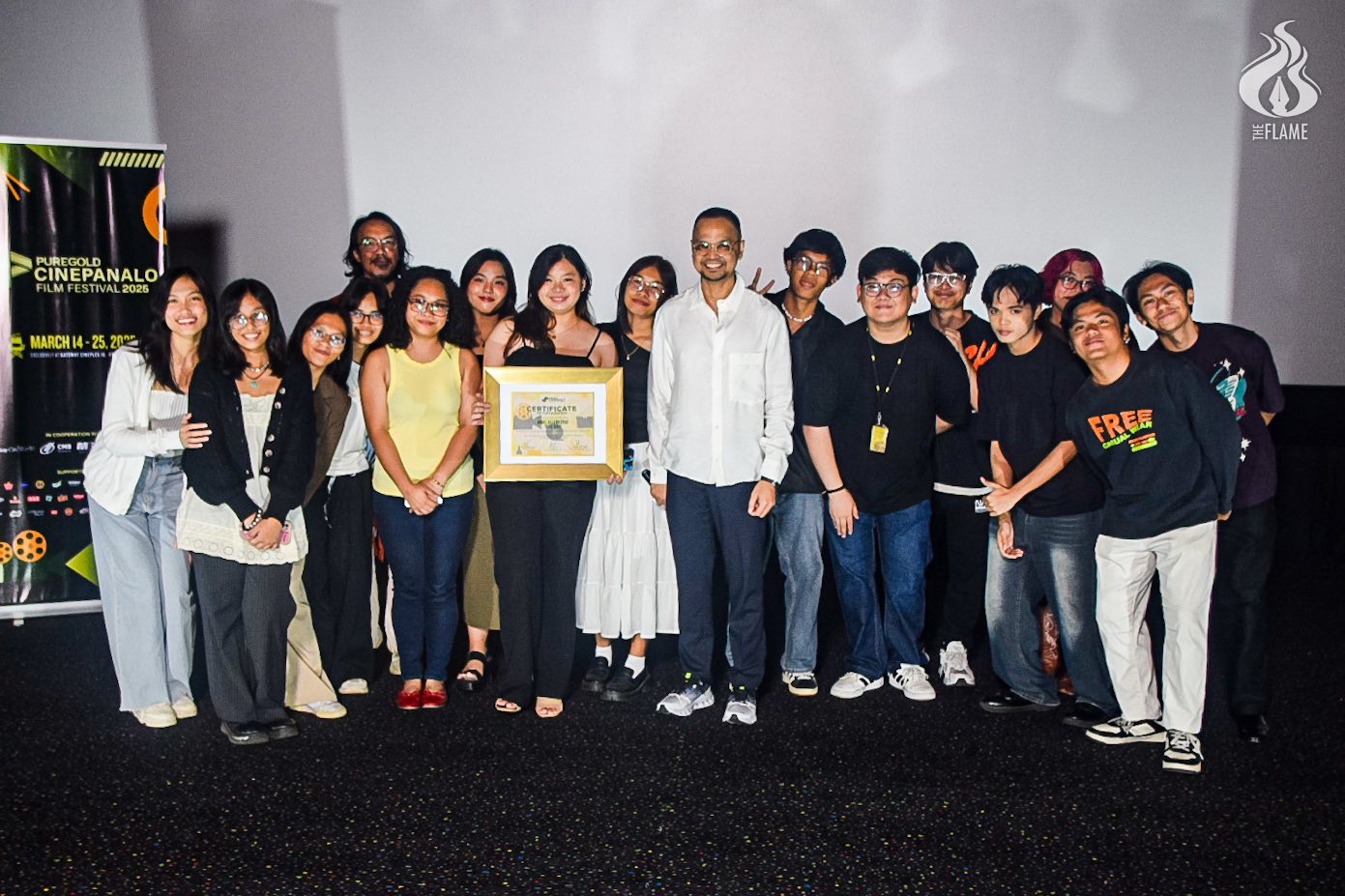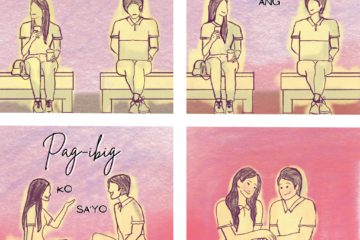
THERE IS an ambiguity within a disaster. It is a destroyer of properties and valuables but a creator of new memories and realizations.
When fused with art, stories of disaster highlight the essence of cinema as a vessel for truth and remembrance. For the UST Thomasian Film Society members behind the Puregold Cinepanalo entry Dito, Dati, one must find a silver lining between memories, self-forgiveness and family in the wake of unexpected endings.
Dito, Dati was among the top 24 films shown at the 2nd Puregold Cinepanalo Film Festival, which runs from March 14 to 25. Directed by third-year Philosophy student Angel Allizon Cruz and written by second-year Communication student and The Flame literary writer Anthea de Sales, the film is set in the aftermath of typhoon Ondoy in 2009 and follows Yumi Buan (Rachel Du, Behavioral Science alumna), the firstborn of the Buan family, who struggles to grapple with the emotion of losing items during the typhoon.
Yumi’s narrative revolved around a videotape containing her self-made film, a discovery amid the rubble that symbolizes her estrangement in her home. What was once missing had finally returned to her—bringing a quiet sense of closure.
The typhoon’s intensity did not spare her belongings from her childhood. Such lost artifacts mimic the lost connection she once had with her family.
Dito, Dati, was inspired by de Sales’ experiences during typhoon “Ondoy” in 2009 and typhoon “Carina” in 2024. Typhoon “Ondoy” caused extensive rainfall in several parts of Luzon. The larger part of Luzon, including Metro Manila was under a state of calamity because of the flooding. Similarly, the capital region was also under a state of calamity when “Carina” hit the Philippines in 2024, the first super typhoon of the year. Its effects included landslides and the overflow of the La Mesa Dam. She talked about the importance of such defining events in her life and how it helped her translate personal experiences into the film.
“What if I write about this feeling? ‘Yung nasalanta kayo ng bagyo parang hindi mo alam kung anong itatapon mo or i-k-keep mo kasi lahat naman may value eh,” de Sales said.
(“What if I write about this feeling? When you’re hit by a typhoon, you are torn between which items to keep and which ones to discard because everything is valuable.)
This initiation of de Sales was seen in the short film through personal artifacts such as the journal of Yumi’s mother, her father’s guitar and her old videotape all symbolizing the things and memories in her life she is torn between keeping or letting go.
Through the filmmakers’ authentic experiences, the film aimed to showcase Filipino spirit after a catastrophe beyond the trope of economic resilience commonly portrayed in Philippine cinema.
Between documentary and fiction
There is a fine line between history written in documents and history preserved through literary pieces. Dito Dati attempted to blur this line.
As artists, they oscillated between staying truthful to the facts and creating certain boundaries in fiction. While Dito, Dati is an account of the aftermath of a calamity, de Sales affirmed that the story does not glorify Filipino resilience, nor does it normalize “poverty porn.” Instead, it dives deeper into the memories of the past and how they shape the future, as seen through Yumi’s characterization.
Hence, filmmaking is a space for rising filmmakers to tell stories that are not only for the self but also to adhere to the obligation of the artist to move other people.
Cruz and de Sales’ filmmaking journey was honed by their early years of film exposure. They challenged themselves in making the short film as they tried to escape their conventions.
“I love filmmaking not because I love films but because I love the making itself,” Cruz said.
The story derived heavily from environmental impacts. However, the typhoon is not just a mere backdrop in the story but is also one of the pillars of the short film when it comes to conveying the message to its audience.
Their objective in choosing to focus on a typhoon as the central narrative was to showcase its characteristics and how its disastrous presence can relate to one’s consciousness and individuality.
“Ginamit namin yung bagyo kasi, bagyo in reality, kahit gaano ka ka-prepared na merong darating na calamity, hindi mo pa rin talaga expected or anticipated or ka-predicted ‘yung magiging impact niya sa’yo,” Cruz said.
(“We used the typhoon because, typhoons, in reality, despite one’s preparedness for an incoming calamity, you still can’t expect or anticipate or even predict the impact it will have on you.”)
In the wake of a disaster, Dito, Dati represented a historic event that affects the majority and, most importantly, the individual. The story gave a refreshing take on typhoon survivors and allowed the audience to humanize these survivors and stray away from reducing them into mere data or statistics.
Taking risks
Dito, Dati itself took a risk, as seen in its unpolished execution of a melodrama centering around Filipino family dynamics. The cinematography still carried the roughness of a developing craft, and its dialogues felt too structured for these to sound natural or convincing. Its soundtrack, however, proved to be the film’s strength as it was able to elevate the melodramatic themes in its short runtime.
Despite the rich thematic context of the film, its subtle choice of straying away from the generic Filipino resilience tropes may have lessened the impact of the story’s pivotal objective, which was to show a person’s internal turmoil after a typhoon.
Yet, in spite of its flaws, Dito, Dati proved that some stories deserve to be chronicled. Both Cruz and de Sales advocate for aspiring filmmakers to take risks, such as joining film festivals, given that the filmmaker community has yet to make its mark in the university.
“Tinanong ako noon kung ano ‘yung ine-expect naming [Thomasian Film Society] award sa Cinepanalo. And nagulat ako na, oo nga ‘no, competition nga pala ‘to. Pero sabi ko, para kasing ang pinaka award na do’n is nakasama kami sa top 25,” Cruz said.
(“I was asked before what awards we were expecting in Cinepanalo. And I had a realization that, right, this is still a competition. But I told myself that being included in the top 25 is already an award in itself.”)
Student-led short films like Dito, Dati are instrumental in shaping narratives and establishing tropes in Philippine cinema. Philippine cinema’s continuous evolution is set through emerging student-led short films, hence its pivotal role in shaping the future.
“If you ever feel burnt out like Yumi, I hope you’ll find your passion one day to keep going. It’s not just UST that needs you; it’s the whole industry in the Philippines,” de Sales said. F



